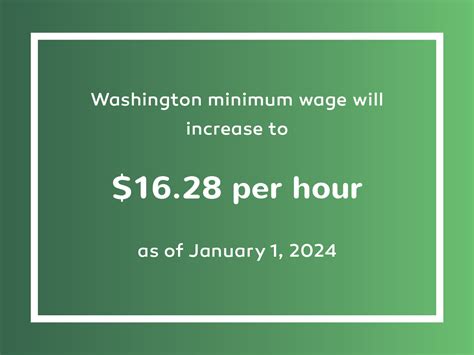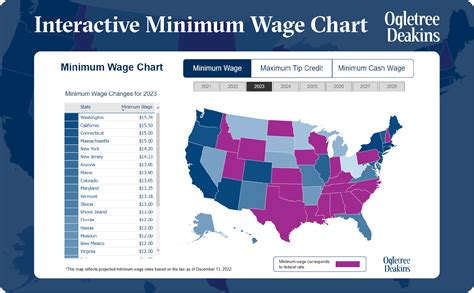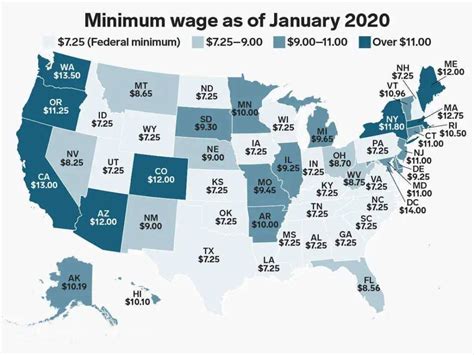Washington State is renowned for its dynamic economy, stunning natural landscapes, and its position as a leader in progressive workplace policies. One of the most significant of these policies is its commitment to a high minimum wage, which provides a strong foundation for workers across various industries. For those starting their careers or working in essential frontline roles, Washington offers one of the highest baseline salaries in the United States, with some of its major cities pushing that standard even higher.
This guide will break down everything you need to know about the Washington minimum salary, from the statewide rate to the key factors that can significantly influence your earning potential.
Understanding the Washington State Minimum Wage


It's important to clarify that "Washington minimum salary" is not a specific job title but a legal pay floor. It is the lowest hourly, daily, or monthly remuneration that employers are legally required to pay to workers. This wage floor applies to most agricultural and non-agricultural jobs across the state for workers aged 16 and older.
The purpose of the minimum wage is to establish a baseline standard of living and prevent exploitation. In Washington, this rate is adjusted annually for inflation to ensure that its value keeps pace with the cost of living. Workers earning this wage are found in a wide array of critical sectors, including retail, food service, hospitality, customer service, and general labor.
Washington Minimum Wage Rates for 2024: State and Local


While the state sets a high bar, several cities have passed local ordinances to establish even higher minimum wages, reflecting the increased cost of living in those specific metropolitan areas.
As of 2024, the primary minimum wage rates in Washington are:
- Statewide Minimum Wage: $16.28 per hour. This rate applies to all employers in Washington State, unless a higher local minimum wage is in effect. (Source: [Washington State Department of Labor & Industries](https://www.lni.wa.gov/workers-rights/wages/minimum-wage/))
- Seattle Minimum Wage: $19.97 per hour. This applies to all large employers (501+ employees) and smaller employers who do not contribute a certain amount toward employee medical benefits. (Source: [Seattle Office of Labor Standards](https://www.seattle.gov/laborstandards/ordinances/minimum-wage))
- SeaTac Minimum Wage: $19.71 per hour. This rate applies specifically to hospitality and transportation workers within the city of SeaTac. (Source: [City of SeaTac](https://www.seatacwa.gov/our-city/employment-and-human-services/minimum-wage-information))
- Tukwila Minimum Wage: As of July 1, 2024, the rate for large employers (over 500 employees) is $20.29 per hour, and the rate for mid-size employers (15-500 employees) is $18.29 per hour. (Source: [City of Tukwila](https://www.tukwilawa.gov/departments/city-clerks-office/minimum-wage/))
Key Factors That Influence Salary


While the minimum wage sets the legal floor, several factors determine whether you will earn that base rate or a higher salary. Understanding these elements is crucial for career planning and maximizing your income.
### Level of Education
While many minimum wage positions do not require a college degree, obtaining further education is one of the most reliable pathways to earning above the minimum threshold. An associate's degree, bachelor's degree, or a vocational certificate can qualify you for roles with higher starting salaries and more significant opportunities for advancement. For example, a retail cashier may earn the minimum wage, while a retail store manager with a business degree will command a much higher salary.
### Years of Experience
Experience is a powerful bargaining chip. An entry-level employee in any field is most likely to start at or near the minimum wage. However, as you accumulate years of experience, you develop valuable skills, increase your efficiency, and demonstrate reliability. An experienced barista, for instance, may earn several dollars per hour more than a new trainee at the same coffee shop due to their speed, customer service skills, and ability to train others. According to Payscale, salary generally increases with experience level across nearly all professions.
### Geographic Location
As demonstrated by the rates in Seattle, SeaTac, and Tukwila, where you work in Washington has a direct and significant impact on your minimum earnings. The higher local wages in the Seattle metropolitan area are a direct response to a higher cost of living, particularly for housing. This means a job in Seattle will have a legally higher starting pay than the exact same job in Spokane or Yakima. When job searching, always check for local ordinances that may work in your favor.
### Company Type and Industry
The industry and the specific company you work for play a major role. Industries like food service and retail are the most common employers of minimum wage workers. In contrast, sectors like technology, healthcare, and professional services typically have much higher starting salaries. Furthermore, larger corporations often have more structured pay scales and may offer wages above the legal minimum to attract and retain talent, a fact even reflected in Seattle's tiered wage ordinance.
### Industry and Job Role (Including Tipped Positions)
Your specific role is fundamental. A general laborer's pay will differ from that of a certified forklift operator. A critical distinction in Washington is its policy on tipped workers. Unlike many states, Washington does not have a "tip credit." This means employers must pay all employees, including servers, bartenders, and other tipped staff, the full state or local minimum wage *before* tips. This makes Washington one of the most financially favorable states for service industry professionals, as tips are supplementary income on top of a high base wage.
Job Outlook


The job outlook for roles typically associated with the minimum wage is varied. These positions are often concentrated in the retail and service industries.
- Retail Salespersons: According to the U.S. Bureau of Labor Statistics (BLS), employment in this field is projected to show little or no change from 2022 to 2032. However, with high turnover, tens of thousands of openings are projected each year as workers leave the occupation.
- Food and Beverage Serving and Related Workers: The BLS projects employment for this group to grow 10 percent from 2022 to 2032, much faster than the average for all occupations. This indicates strong and sustained demand for workers in restaurants, bars, and cafes.
While these roles provide a crucial entry point into the workforce, they also serve as a foundation for building skills that lead to higher-paying positions in management, supervision, or specialized customer service roles.
Conclusion


Washington State provides one of the strongest salary floors in the nation, ensuring a high baseline for workers. The key takeaways for anyone considering working in Washington are:
- Know Your Rate: The statewide minimum is a robust $16.28 per hour, but it can be significantly higher (approaching or exceeding $20 per hour) in cities like Seattle, SeaTac, and Tukwila.
- Location is Everything: Where you work in Washington can directly increase your base pay due to local ordinances.
- Tips are a Bonus: Washington's pro-worker stance means tipped employees receive the full minimum wage *plus* their tips, creating substantial earning potential in the service industry.
- Build for the Future: While the minimum wage provides a solid starting point, the keys to moving up the salary ladder are gaining experience, pursuing further education or certifications, and strategically targeting industries and companies that offer higher pay and career growth.
For those starting their career journey, Washington's minimum wage offers not just a paycheck, but a stepping stone toward greater financial stability and professional success.
